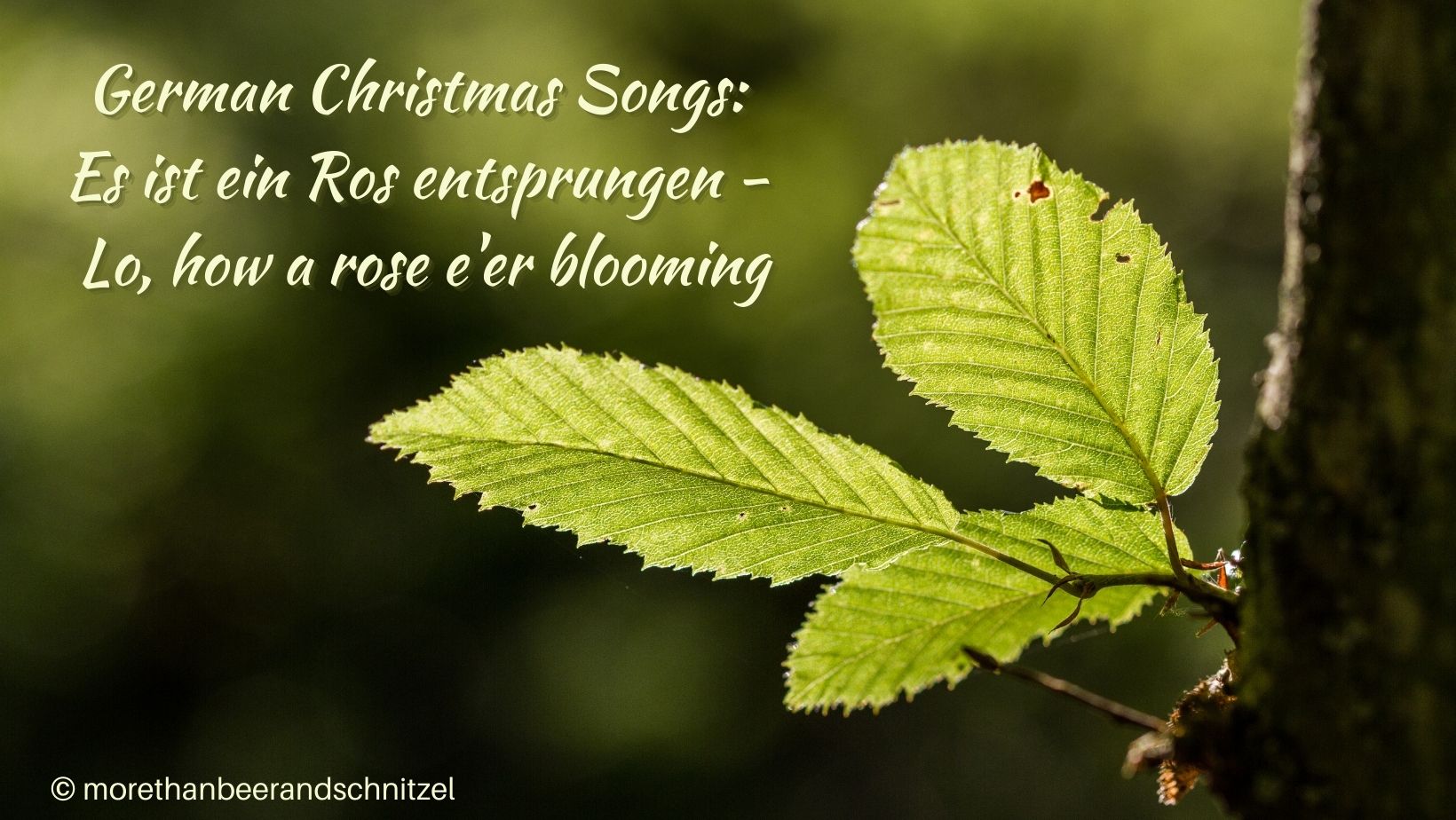Es ist ein Ros’ entsprungen is another very old Christmas carol and a Marian hymn, just like Es kommt ein Schiff geladen. The most known translation into English was written by Theodore Baker in 1894. The song in his translation is called Lo, how a rose e’er sprung. Other titles are A spotless rose by Catherine Winkworth (1869), and Behold a rose of Judah.
You can find this song and other German language Christmas songs in this youtube playlist.
Text and Music
The song first appeared in print in the Speyrer Gesangsbuch (Speyer hymnbook) in 1599. The author is unknown, and we also don’t know who the composer of that melody is. It seems that the original only had two verses but today we generally sing three verses.

Michael Praetorius wrote the four-part harmonization using the original score in 1609 and that is the setting we most know and sing today. While the song has been included in Catholic and Protestant hymnbooks, the second stanza varies. Praetorius, a Protestant, is said to have changed the words to emphasize Jesus instead of the Virgin Mary. (see in the lyrics)
The text has been modernized over time but the endings of the second verse differ in the last line. In the Catholic version nowadays, it says “und blieb ein reine Magd” (and remained a pure maid), and the Protestant one ends in “welches uns selig macht” (which makes us blessed).
In 1844, Friedrich Layriz added three verses to the original two, and the first one of his stayed on throughout time.
During the Nazi regime the text was rewritten to eliminate the religious component. The song began with “Uns ist ein Licht erstanden / in einer dunklen Nacht” (A light has arisen for us/on a dark winter night) and the emphasis was on the fatherland and motherhood in general.

Text in German and the Translation by Baker
Es ist ein Ros entsprungen,
aus einer Wurzel zart,
wie uns die Alten sungen,
von Jesse kam die Art
Und hat ein Blümlein bracht
mitten im kalten Winter,
wohl zu der halben Nacht.
Das Röslein, das ich meine,
davon Isaias sagt,
ist Maria die reine
die uns das Blümlein bracht.
Aus Gottes ew’gem Rat
hat sie ein Kind geboren
und blieb ein reine Magd.
or: Welches uns selig macht.
Das Blümelein, so kleine,
das duftet uns so süß,
mit seinem hellen Scheine
vertreibt’s die Finsternis.
Wahr Mensch und wahrer Gott,
hilft uns aus allem Leide,
rettet von Sünd und Tod.
Lo, how a rose e’er blooming,
From tender stem hath sprung.
Of Jesse‘s lineage coming,
As men of old have sung;
It came, a flow’ret bright,
Amid the cold of winter,
When half spent was the night.
Isaiah ’twas foretold it,
The Rose I have in mind,
With Mary we behold it,
The virgin mother kind;
To show God’s love aright,
She bore to men a Savior,
When half spent was the night.
O Flower, whose fragrance tender
With sweetness fills the air,
Dispel with glorious splendour
The darkness everywhere;
True man, yet very God,
From Sin and death now save us,
And share our every load.
Meaning
The first thing we need to realize when looking about this poem is that the author isn’t talking about a Rose or rose though it does look like it. Ros here means Reis and in English it’s probably best translated as sprig.
The first stanza is full of metaphors and we don’t know exactly what is meant by them. But then the second verse explains it: the Ros (sprig) is the Virgin Mary and the Blümlein (little flower) is Jesus. They are springing from the Tree of Jesse and thereby linking Mary and Jesus to Jesse and his son King David.
The first verse is a direct allusion of Isaiah / Jesaja 11:1:
And there shall come forth a rod out of the stem of Jesse, and a Branch shall grow out of his roots. (KJV)
Und es wird ein Reis hervorgehen aus dem Stamm Isais und ein Zweig aus seiner Wurzel Frucht bringen. (Luther)
The rest of the song is relatively straight forward and tells the story of the Virgin Mary bearing Jesus in a dark cold night. Jesus is described as the Savior who brings light into the darkness.


